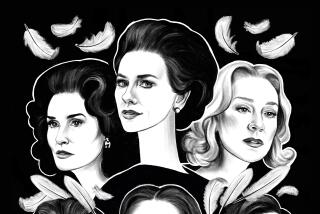‘Wood’ Tarnishes a Good Man--Lugosi
- Share via
The photograph accompanying David Kronke’s article “A Bela and His Chihuahuas” (Calendar, Oct. 2) was a vivid reminder that, for all the lively entertainment of Tim Burton’s “Ed Wood,” the movie does Bela Lugosi a terrible disservice and highlights the shallowness of the research done on him.
Actually the photo of actor Martin Landau, portraying Lugosi with a Chihuahua in each hand, is one of the less significant distortions in the film. But it jumped out at me because the real Lugosi was a man who only had large dogs such as Dobermans and German shepherds.
As one who saw Lugosi in his latter years and has often written about him, I was moved to telephone Bela Lugosi Jr. to get his reaction. The late actor’s son, who has not seen the film but had been told about it by friends, said the Chihuahua photo was indeed indicative of what he heard about the film’s more damaging inventions.
“I can understand taking some dramatic license for certain story points. I can look the other way when the Lugosi character is shown improbably done up in white tie and tails to sit in front of a TV set watching himself in one of his old movies (“White Zombie”) with those little dogs. It’s harder to ignore the gross words my father, a warm but dignified man, would never say--such as certain references to Vampira’s anatomy or his scatological remarks regarding Boris Karloff. The so-called animosity between my father and Karloff existed in the publicity mills, anyway--not in real life.”
Then Lugosi Jr. got to a more significant point: “I cannot ignore the film’s misconstruction of my father’s drug rehabilitation. The truth, in this case, is actually more dramatic than fiction, but it doesn’t star Ed Wood. My dad, who had a medically induced addiction to morphine, turned himself in--with no Mr. Wood accompanying him, contrary to what the film shows--to Metropolitan State Hospital in Norwalk. The film suggests Wood takes him home after a doctor discovers that he has no money.” A scene in which Wood tells Lugosi that he’s fine and can go home while Lugosi protests that he doesn’t feel fine gives the impression that Lugosi left professional care before he was completely cured.
“My father’s willingness to swallow the pride of a once-famous film star and expose himself to the indignities and often horrific conditions of a facility for indigents--and stick it out until he was, indeed, clean--is testament to his courage. When he was released he was optimistic because he had completed something that took enormous character. I don’t want him to be robbed of that accomplishment.”
My own father, Jimmy Mitchell, knew Lugosi during the years covered in the film and, while it is true that Lugosi was greatly depressed about his career, he was not the lonely, pathetic, isolated man of “Ed Wood” in which Edward D. Wood Jr. seemed to be his only human contact. “My dad was living with my mother and me during the making of the first two of the Ed Wood movies,” Lugosi Jr. said. “And after my parents divorced, I visited him regularly. My father was a well-read, forward-thinking man who had friends--many within the Hungarian community--and a new wife with whom he was living at the time of his death.”
Lugosi desperately wanted and needed the dignity of work. And, yes, it was Wood who, albeit for his own exploitative purposes, gave Lugosi the chance to wake up in the morning knowing he had a job that day with someone who admired him.
“I am saddened that a new generation of moviegoers will be exposed to an inaccurate picture of my father that shows him in a false and denigrating light,” said Lugosi Jr., an attorney in Los Angeles. He is also “puzzled that no one among the people responsible for shaping the Lugosi role ever came to me for help with research. In addition to my firsthand recollections of my father and Ed Wood, I have an extensive information bank of material--such as Ed Wood’s original, handwritten account of his relationship with my father and the making of the films, as well as tapes of Wood’s comments in his own voice.”
*
And if they used Robert Cremer’s 1976 biography, “Lugosi: The Man Behind the Cape,” which Lugosi Jr. believes accurately covers the Ed Wood period, he feels there is scant evidence of it. “It is interesting that in the hundreds of interviews Cremer conducted with people who knew and worked with my dad, there was no reporting of his using the type of language put in his mouth in ‘Ed Wood,’ ” Lugosi Jr. said.
“My dad left a wonderful legacy as an actor, father and friend. He deserves better than to have the most difficult part of his life resurrected only to be distorted.”
More to Read
Only good movies
Get the Indie Focus newsletter, Mark Olsen's weekly guide to the world of cinema.
You may occasionally receive promotional content from the Los Angeles Times.










